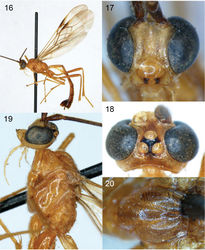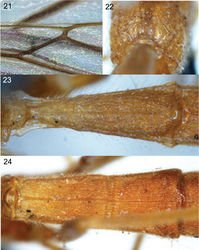Cystomastacoides nicolepeelerae
| Notice: | This page is derived from the original publication listed below, whose author(s) should always be credited. Further contributors may edit and improve the content of this page and, consequently, need to be credited as well (see page history). Any assessment of factual correctness requires a careful review of the original article as well as of subsequent contributions.
If you are uncertain whether your planned contribution is correct or not, we suggest that you use the associated discussion page instead of editing the page directly. This page should be cited as follows (rationale):
Citation formats to copy and paste
BibTeX: @article{Quicke2013JournalofHymenopteraResearch31, RIS/ Endnote: TY - JOUR Wikipedia/ Citizendium: <ref name="Quicke2013Journal of Hymenoptera Research31">{{Citation See also the citation download page at the journal. |
Ordo: Hymenoptera
Familia: Braconidae
Genus: Cystomastacoides
Name
Cystomastacoides nicolepeelerae Quicke sp. n. – Wikispecies link – ZooBank link – Pensoft Profile
Material examined
Holotype female, Papua New Guinea, Kokoda I, ix–x.1933, 200ft, L. E. Cheesman (museum code B.M. 1933-427) (BMNH)
Paratype [probably] female, Papua New Guinea, Oro Province, Kokoda, x.1933, 1200ft, L. E. Cheesman (museum code B.M. 1933-321) (BMNH)
Morphology
Length of body 13 mm, and of fore wing 11.2 mm.
Head. Antenna incomplete, with at least 44 flagellomeres. Median flagellomeres approximately 2.5 × as long laterally as wide. 3rd segment of maxillary palp 5 × longer than maximally wide with weak expansion; 2nd segment of labial palp with rather large flattened, triangular flange. Face with moderately protruding midlongitudinal area, largely densely punctate with punctures largely confluent giving rise to transverse rugulose appearance. Frons with two oblique striae between antennal socket and eye, extending slightly behind antennal socket, otherwise smooth. Distance between posterior ocelli: transverse diameter of posterior ocellus: shortest distance between posterior ocellus and eye = 1.25:4.5:1.0. Vertex with weak groove running from stemmaticum to occipital carina. Occipital carina complete, more or less smoothly rounded.
Mesosoma. Notauli very deep, punctate anteriorly, crenulated posteriorly, almost meeting just anterior to deep midposterior pit on mesoscutum. Scutellar sulcus wide with single carina medially. Mesopleuron largely smooth and shiny with some small punctures at the bases of setae, precoxal sulcus long, moderately impressed, rather narrow, almost completely smooth. Propodeum strongly and extensively rugose, with lateral carinae distinct posteriorly and protruding.
Fore wing. Vein 2-CU1 4.1 × longer than 1-CU1. Vein 3-SR 2.3 × longer than r. Vein SR1 1.1 × longer than 3-SR.
Hind wing. Vein M+CU 1.4 × length of 1-M. Vein 2-SC+R distinctly transverse, reclivous. Vein m-cu absent.
Metasoma. 1st metasomal tergite 2.3 × longer than posteriorly wide. Metasomal tergites 1, 2 and 3 with strong midlongitudinal carina. Tergites 1-4 densely deeply punctate with punctures forming longitudinal rows separated by weak longitudinal to sublongitudinal striae. Tergite 4 densely finely punctured with little trace of striation. Tergite 5 largely smooth and shiny with few punctures. Hypopygium strongly curved ventrally.
Coloration. Antennae blackish basally becoming yellow brown gradually from near middle to apex. Body and legs largely brown yellow, posterior metasomal tergites somewhat darker, hypopygium and sides of tergite 6 brown-black, stemmaticum black. Pterostigma largely dark brown but with anteromedially black. Fore wing veins C+SC+R and basal half of M+CU, paler brown yellow, wing membrane largely hyaline but distinctly apically infuscate.
Etymology
Named in honour of Nicole Peeler, one of DQ’s favourite authors.
Original Description
- Quicke, D; Smith, M; Hrcek, J; Butcher, B; 2013: Cystomastacoides van Achterberg (Braconidae, Rogadinae): first host record and descriptions of three new species from Thailand and Papua New Guinea Journal of Hymenoptera Research, 31: 65-78. doi
Images
|

